
Fast, affordable Internet access for all.

Language added to a New York State budget bill is threatening to undermine a municipal broadband grant program established by Gov. Kathy Hochul’s office earlier this year.
Known as the Municipal Infrastructure Program, it was designed to provide grant funding for municipalities in the state eager to build publicly-owned, locally controlled broadband infrastructure as a way to ensure ubiquitous, affordable access to high-quality Internet after decades of frustration with expensive, spotty and uneven service from the regional monopolies.
Currently, New York state lawmakers are in the midst of budget proposal season in which the Governor’s office and both legislative chambers (the state Senate and Assembly) have until April 1 to reconcile and complete a final budget for the upcoming fiscal year.
Buried near the bottom of the Assembly budget proposal (A8805B) is a Trojan horse legislative sources say is being pushed by lobbyists representing Charter Spectrum, the regional cable monopoly and 2nd largest cable company in the U.S. that was nearly kicked out of New York by state officials in 2018 for atrocious service.
One year after launching a municipal fiber network, Dryden, NY officials say they’re making steady progress in their quest to expand affordable fiber broadband to the entire town of 14,500.
While the effort hasn’t been without obstacles, town leaders say the public response to their foray into broadband has been overwhelmingly positive.
“While there are challenges, we are continuing to make great progress in the buildout,” Dryden Town Supervisor Jason Leifer tells ILSR. “We have support from our residents, who continue to show interest in this project. We also have financial support from Tompkins County in the form of grants–and from neighboring municipalities who are interested in replicating our model.”
The city’s network began with a 50-home trial pilot trial in the southwest part of town. The broader $15 million network will be funded by a combination of bonds, $2 million in federal COVID-19 disaster relief funding, an Appalachian Regional Commission grant, and eventually, subscriber revenues.
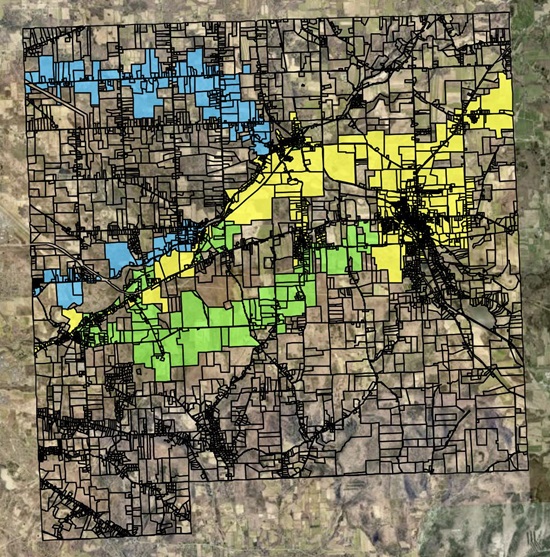
The town took a phased approach to deployment, first by connecting the backbone of the network in the southeast of the city, followed by a focus on the western and eastern halves of the municipality, respectively. The Dryden fiber website features a build map that helps locals track network progress.
“We have currently passed over 420 addresses with our buildout,” freshly-appointed Dryden Fiber Executive Director David Makar tells ISLR. “This includes over 150 rental properties – mostly single family homes and apartments – as well as many owner occupied homes and businesses. We are still in phase one, and as we move into the village of Dryden and the hamlets of Varna, Ellis Hollow, and Etna, we will be in phase two.”
Cullman, Alabama-based Cullman Electric Cooperative says it is launching a new phase of fiber deployment after receiving a $7 million grant to bring affordable fiber access to long-neglected Cullman and Winston counties.
The financing was made possible by the Alabama Broadband Accessibility Fund (ABAF), funded by the 2021 American Rescue Plan Act (ARPA). The state has already dedicated more than $82 million in funding for Alabama broadband deployments, bringing broadband access to 72,000 currently unserved residents.
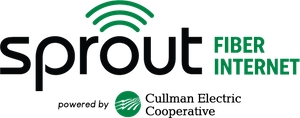
Cullman’s $7 million portion will bring affordable fiber access to 1,300 families. Known as Sprout Fiber Internet, Cullman currently offers residential customers symmetrical 300 Mbps (megabit per second) service for $60 a month; symmetrical 1 Gbps (gigabit per second) service for $80 a month, and symmetrical 2 Gbps service for $120 a month.
That’s significantly faster and cheaper service than is currently offered by any of the dominant private telecom monopolies in Cullman (predominantly AT&T or Charter/Spectrum), without usage caps, hidden fees, or long-term contracts.
Fort Worth, Texas, (est pop. 956,000) has struck a $7.5 million, 34-year contract with Dallas-based Sprocket Networks to construct a new 300-mile fiber optic backbone to shore up city municipal communications needs, expand affordable access to marginalized neighborhoods, and boost local economic development.
City officials say construction crews are expected to begin work sometime in the next three to six months, with the full network construction expected to cost $65 million and take three years to complete.
Services will first be made available to nine target neighborhoods (including Las Vegas Trail, Como, Marine Creek, Stop Six, Rosemont and Ash Crescent) on a rolling basis. Sprocket Networks will own the finished fiber network.
“This partnership was entered into with Sprocket with the hopes of eventually getting to universal service in Fort Worth,” Fort Worth IT Solutions director Kevin Gunn told ILSR in a phone interview. “We want the gold standard fiber optic connectivity: 100 megabits symmetric and up available at every doorstep, whether that's a senior family, multifamily or commercial.”
Gunn told ILSR that the city’s initial payment of $7.5 million to Sprocket consists of $4.5 million in American Rescue Plan Act (ARPA) funds, and $3 million from the North Central Texas Council Of Governments, which has allocated some of its transportation budget to broadband improvements the agency will benefit from.
In response to COVID era broadband inequities, the city of Fort Worth last year expanded free Wi-Fi access to 40,000 largely underserved city residents. Gunn indicated that those connections will be slowly phased out as the city transitions to fiber.
New England residents have been complaining about Verizon’s lack of meaningful fiber upgrades for the better part of the last two decades, prompting a steady parade of interest in community owned and operated fiber networks in states like Massachusetts.
But some of these community broadband efforts, such as West Springfield’s plan to deliver affordable fiber access to every city resident, are still being hampered by Verizon.
In 2021 the city (est. pop. 28,000) announced it would be partnering with Westfield Gas and Electric, the publicly owned utility in Westfield, Massachusetts, which has built and operates fiber networks in nearly two dozen communities in the Berkshires. The end result: Westfield Gas and Electric's broadband subsidiary Whip City Fiber plans to deliver West Springfield residents symmetrical gigabit fiber for $75 a month, without long term contracts or onerous hidden fees.
But efforts to launch a $1.8 million pilot project have been on hold thanks to ongoing delays by Verizon and Eversource to prepare local utility poles for fiber attachment, West Springfield Chief Technology Officer Stephanie Straitiff tells local news outlet The Reminder.
With the Affordable Connectivity Program (ACP) poised to run out of funding in early Q2 next year, and no funding source lined up to keep the program alive, a recent U.S. News & World Report survey underscores the significance of the program in the face of rising prices from the nation’s major Internet Service Providers (ISPs).
The ACP offers a monthly benefit of $30 dollars for qualifying households and $75 for qualifying households on Tribal lands (as well as in some remote areas). Over 20 million Americans to date have enrolled in the program to help pay their Internet service bills, but with the $14.2 billion ACP program on track to run dry as soon as May of next year – even amid a historic national effort to establish “Internet For All” – the affordability crisis has become more worrisome for a growing number of Americans.
U.S. News & World Report’s survey found that Internet prices are going up and that families are compromising other expenses to pay for connectivity, affirming the urgency among digital equity advocates to identify a source of continued funding for ACP, as well as push for more structural solutions that address the root causes of why Americans pay among the highest prices for broadband service in the developed world.
Cleveland, Ohio is putting the finishing touches on an ambitious plan to build a citywide open access fiber network–and deliver affordable fixed wireless service–at minimal cost to city residents. The double-edged proposal aims to bring both meaningful broadband competition–and lower rates–to the long neglected city of 1.7 million people.
Last month, the city announced it had awarded $20 million in ARPA (American Rescue Plan Act) funds to Cleveland-based digital equity non-profit DigitalC. Under the proposal, DigitalC will spend 18 months building a fixed wireless broadband network capable of providing locals with symmetrical 100 Megabit per second (Mbps) service for $18 a month.
DigitalC’s fixed wireless service, EmpowerCLE+, launched in 2018 and accelerated its deployment in 2020 to meet the needs of frustrated parents and workers during peak COVID.
Speaking at ILSR’s and the National Digital Inclusion Alliance (NDIA) Building for Digital Equity (B4DE) event last week, DigitalC CEO Joshua Edmonds noted that the EmpowerCLE+ network currently passes 23,500 households in Cleveland, with 2,300 current subscribers. The city’s new agreement with the city should expand the network’s potential reach to 99.9% of homes in Cleveland.
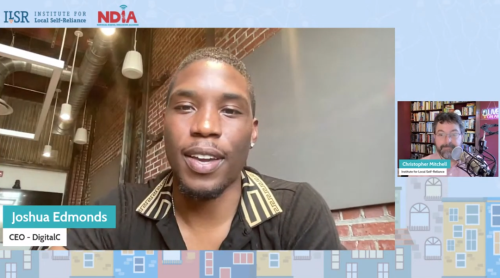
“We're thankful for the opportunity and we're just really hoping that people use this as motivation to change things within their respective markets,” Edmonds told ILSR in a phone interview.
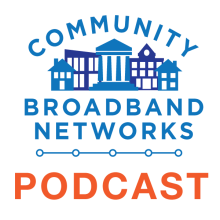
This week on the podcast, Christopher is joined by Karl Bode, a returning guest who has long covered tech and the telecommunications industry. After a short conversation about the continued absence of monopoly abuse in policy conversations about broadband access and affordability today, Karl and Christopher tackle the proposed return to net neutrality announced by Chairwoman Rosenworcel last week.
They talk about how we got here in the first place, including the landmark decision by the Commission in 2015 to largely abdicate responsibility for Internet-related regulatory activities and the states that stepped in to fill the void. They end the show by considering for a bit what it might be like to have an expert federal agency whose activities governed by a strong regulatory framework and the teeth to enforce its mandate to extend fast, affordable, reliable Internet access for all.
This show is 38 minutes long and can be played on this page or via iTunes or the tool of your choice using this feed. You can listen to the interview on this page or visit the Community Broadband Bits page.
Transcript below.
We want your feedback and suggestions for the show-please e-mail us or leave a comment below.
Listen to other episodes here or view all episodes in our index.
Subscribe to the Building Local Power podcast, also from the Institute for Local Self-Reliance, on iTunes or Stitcher to catch more great conversations about local communities, the concentration of corporate power, and how everyday people are taking control.
Thanks to Arne Huseby for the music. The song is Warm Duck Shuffle and is licensed under a Creative Commons Attribution (3.0) license.
Superior, Wisconsin officials have given the green light to the first pilot area for Superior’s new city-owned fiber network. Dubbed Connect Superior, the open access fiber network aims to deliver affordable gigabit access to every resident, community anchor institution and business in the city of nearly 27,000.
On July 5, the Superior City Council voted 8-1 to approve deployment in the project’s first pilot area: a swath of around 821 homes and businesses lodged between Tower Avenue, Belknap Street, and North 21st streets. The vote lets the city now begin issuing RFPs for network construction and negotiate with potential network tenants.
In 2020 the city passed a resolution declaring fiber essential infrastructure. In 2021, the city council voted overwhelmingly to move forward on a deployment master plan developed for the city by EntryPoint Networks. The initial $2.26 million cost of the pilot will be paid for with the help of $5 million from the city’s $17 million allocation from the American Rescue Plan Act funding.
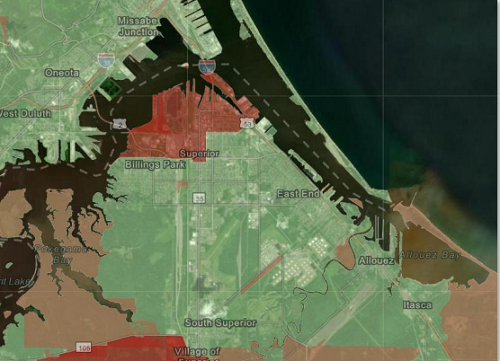
A citywide deployment, should the city pursue it, is expected to cost somewhere around $31 million. The city remains hopeful that much of the cost can be offset by what it hopes will be a 40 percent take rate among local residents and businesses.
The city of Dublin, Ohio has struck a public private partnership with altafiber (formerly known as Cincinnati Bell) to build a new citywide fiber network city leaders hope will finally deliver the kind of affordable, next-generation broadband access Dublin’s 50,000 residents have long been clamoring for.
In 2022 the city issued a request for proposal (RFP) looking for a partner on a citywide network build. At a June 26 meeting, the Dublin city council voted unanimously to select altafiber from a roster of seven potential applicants.
According to the arrangement, construction of the city network is expected to begin in Spring of 2024, with every premise in Dublin passed by a 10 gigabit per second (Gbps) capable network within three years. A select number of undetermined customers are expected to be brought online sometime in the latter part of next year, officials tell ILSR.
A city press release notes that altafiber will invest $35 million in the fiber network, as well as potentially providing the infrastructure necessary to help the city support either public Wi-Fi initiatives or a City Innovation Center. The city says it will pay about $6 million to bury the necessary fiber infrastructure citywide.